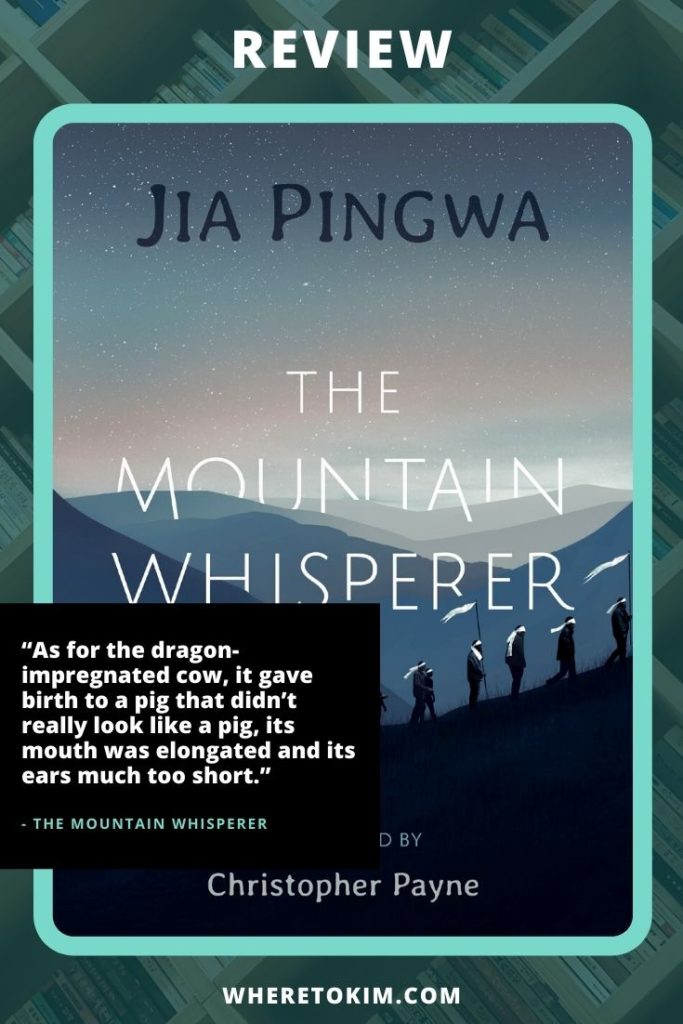The Mountain Whisperer by Jia Pingwa combines historical and mythical knowledge into a turbulent and rich story set in rural China. This book is pure and warm, cruel and mean, and above all, absurd and compelling.
Location: Loess Plateau in Shaanxi Province in China
The Mountain Whisperer synopsis
TIME IS A THIEF, BUT NOT DEATH
In a cave high in the ageless mountains of China’s desolate interior, an ancient funeral singer awaits the end. From his deathbed he gives voice to the generations of villagers to whom he devoted his life’s work, and four all-too-human souls whose struggles defined an era.
A soldier, a peasant, a revolutionary and a politician. When revolt and reform take hold of the wartorn plains, all play their debased roles in the mythic cycle of avarice, vengeance and suffering.
As his four tragedies interweave, the cracked lips of the dying sage conjure a stark vision: a retelling of the forging of the People’s Republic – from turbulent birth to absurd reversal – whispered from its uncharted margins.
Book review
This is a story about the mysterious, elusive mountain whisperer whose tall tales were enjoyed by those who listened but believed by few. It is also a story about the land and its people. To quote the author: “I strained and tortured myself trying to find a means by which local history could return to literature, how narrative could grow in the spaces between words.”
Jia Pingwa’s unique writing style transports you right to the scene. This book is pure and warm, cruel and mean, and above all, absurd and compelling.
Mythical and elusive
The mountain whisperer saw it all happen: the revolution, the land reform and re-education. Each tale focuses on a different part of the past. The impact of China’s fight against capitalism on life in the provinces is immense. The common people have no clue about what is going on. And among them walks the mountain whisperer, a good-humored fellow with a pleasant demeanor. He goes about his daily business as he always has, pretty much unfazed by it all. He is the constant factor, the anchor amidst change, at least for the duration of this book. Yet time changes for him as well.
As the mountain whisperer nears the end of his life, a shepherd sends his grandson to keep him company. With a teacher, the boy studies the Pathways Through the Mountains and Seas; a compendium of the strange and fantastic. Just like Pathways is about the entirety of China, so is Jia Pingwa’s book, except that Pathways focuses on geography and The Mountain Whisperer focuses on people. The mythical beasts in Pathways resemble people and the people in The Mountain Whisperer often exhibit animal characteristics. Strange things happen in ordinary situations and life doesn’t quite play out as you would expect.
Walking among them
This book is not about people’s emotions, but rather about how people relate to other people. You feel like you are walking among them, watching them go about their daily business and observing them in the same way that the mountain whisperer does. It is easy to visualize your surroundings, but you have to be in the right mood for this kind of immersion. The pace of the story could be described as slow if not for the fact that events are often sudden and absurd.
The writing style is episodic and events are chronologically told. During the first tale, I was still getting used to the writing style, but I liked the second and fourth tales. The third tale was my least favorite because there were too many characters with minor roles and the story did not seem focused.
Funny and gruesome
Most characters don’t seem to have a deep motivation for their actions; they’re pushed in a certain direction by situations they find themselves in. Some characters see the fun of it when things don’t go as planned. I often find myself grinning, wondering if I am even allowed to grin at some of the more gruesome but funny situations. I like the tone of the story, especially how some weird and gory facts are stated matter-of-factly as if the narrator were recounting ordinary events.
There are plenty of trigger-happy people calling for the deaths of others, desecrating bodies and graves to give offense. People die left and right and you don’t get a chance to get close to the characters. “Wang tried to get down from his bed, but his legs betrayed him and he fell face first into the chamber pot. It’d not been emptied and Wang Caidong drowned in his own piss.” People’s deaths are often like that: in one sentence you learn about their intended or accidental death. It’s a kind of dry humor that works well for me. At times I felt like I was reading a book on ways to die.
Conclusion
The writing style in The Mountain Whisperer reminds me of other books from Chinese authors, but even among them, Jia Pingwa has a unique style that is not for everyone because of its episodic nature, number of names and dry humor. With his descriptions and detail, he tells about life in rural China and manages to transport you to the scene. I felt like I spent some days living in the countryside.
This book is a mix of historical and mythological knowledge, including some insights into Chinese culture and some musings by the author in the Afterword of which I am jealous. Don’t read this book if you are looking for an exciting plot; read it for the immersion, the meaning and implications of events, and the dry observations (and a hundred different ways to die a horrible death in one sentence). This book intrigued me. I found it hard to remember who was who while reading, but now that I’ve finished reading I keep thinking about some of the characters and the lives they lived.
Interested?
Get your copy of The Mountain Whisperer from Amazon (available 28 May 2021).
Book details
Title: The Mountain Whisperer
Author: Jia Pingwa
Translator: Christopher Payne
Language: English
Publisher: Sinoist Books
Pages: 552
ISBN (13): 9781910760703
Publication date: 28 May 2021
About the author and translator
Jia Pingwa (1952- ) stands with Mo Yan and Yu Hua as one of the biggest names in contemporary Chinese literature. A prolific producer of novels, short stories and essays, he has a huge following on the Chinese mainland, as well as in Hong Kong and Taiwan. Jia Pingwa’s fiction focuses on the lives of common people, particularly in his home province of Shaanxi, and is well-known for being unafraid to explore the realm of the sexual. Ruined City was banned for many years for that same reason, and pirated copies sold on the street for several thousand yuan apiece.
Christopher Payne‘s background is in East Asian Studies, with a particular focus on cultural production from the People’s Republic of China (PRC), Taiwan, and Hong Kong. He has four published translations, two novels by Mai Jia 麦家 (published by Penguin), one by Jiang Zilong 蒋子龙 (published by ACA), and Distant Sunflower Fields《遥远的向日葵地》 by Li Juan 李娟 (published by Sinoist Books).
Many thanks to Sinoist Books and NetGalley for a digital ARC of this novel in exchange for an honest review.







